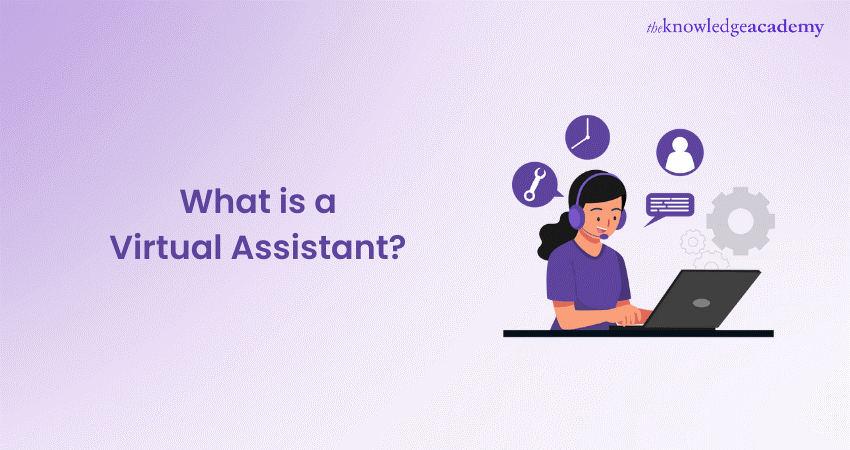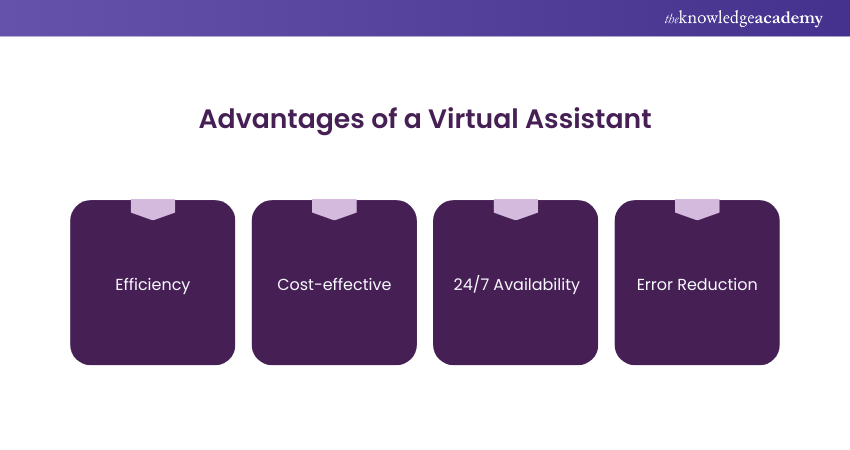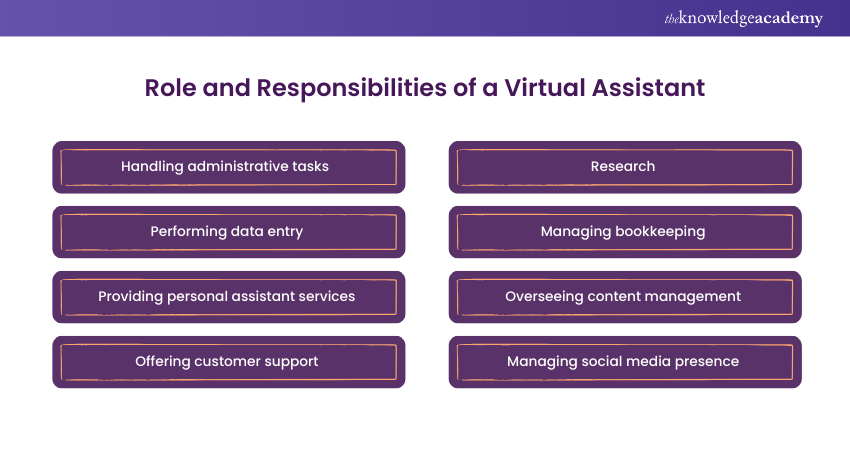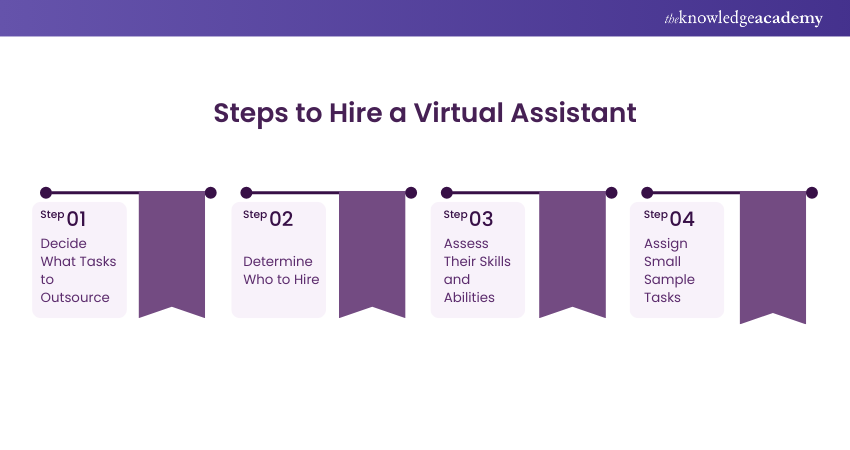We may not have the course you’re looking for. If you enquire or give us a call on + 1-866 272 8822 and speak to our training experts, we may still be able to help with your training requirements.
We ensure quality, budget-alignment, and timely delivery by our expert instructors.

Have you ever thought about how successful companies manage to stay on top of their workload without feeling stressed? Understanding What is a Virtual Assistant could be the key to this. A Virtual Assistant (VA) is a remote expert who manages essential tasks such as handling emails, scheduling appointments, and even managing social media. By delegating these responsibilities, businesses can focus on growth and innovation.
This support helps organisations of all sizes stay organised and productive without the burden of daily administrative tasks. Let’s explore What is a Virtual Assistant and how they can help you remain competitive in today’s changing environment.
Table of Contents
1) What is a Virtual Assistant?
2) How Does a Virtual Assistant Work?
3) Advantages of a Virtual Assistant
4) Types of Virtual Assistants
5) What Does a Virtual Assistant do?
6) Benefits of a Virtual Assistant
7) How to Become a Virtual Assistant?
8) How to Hire a Virtual Assistant?
9) What Makes a Good Virtual Assistant?
10) How Much Do Virtual Assistants Make?
11) Conclusion
What is a Virtual Assistant?
A Virtual Assistant (VA) is a proficient professional who provides specialised assistance from a distance. A VA could also be a software, skilled in managing various tasks proficiently. They are competent in a wide range of tasks, from basic administrative duties to intricate and specialised projects, customised to fit the specific requirements of every client.
The main job of a Virtual Assistant is to greatly enhance productivity and efficiency in a business or personal environment. With a deep knowledge of different tools and technologies, Virtual Assistants can handle calendars, sort emails, carry out research, and more. Their ability to adjust easily and effectively is extremely useful in both professional and personal areas, enabling clients to concentrate on important goals.
From handling day-to-day tasks to taking on complex projects, Virtual Assistants provide top-tier assistance in the digital era. They symbolise a revolutionary change in the way tasks are completed, blending their skills with the ease of remote access. As we progress deeper into a technology-based society, Virtual Assistants are changing the expectations for productivity and efficiency, providing expert help and assistance constantly.
How Does a Virtual Assistant Work?
A Virtual Assistant operates on Artificial Intelligence (AI) and Machine Learning (ML) principles, bringing a new dimension to task automation. At its core, a Virtual Assistant is an application designed to comprehend and execute tasks without constant human oversight. It relies on advanced algorithms to interpret user commands, learn from interactions, and adapt to evolving needs over time.
The process starts with the user entering commands or queries, and the Virtual Assistant uses natural language processing to interpret. Leveraging pre-programmed knowledge and continuous learning from user interactions, it refines its ability to provide accurate and contextually relevant responses. This learning process enables Virtual Assistants to evolve, becoming more adept at anticipating user needs.
Furthermore, Virtual Assistants can integrate with other applications and systems, allowing them to access and manipulate data across various platforms. This seamless integration enhances their ability to manage various tasks, from simple queries to intrinsic problem-solving, making them essential in our digital world.
Master essential skills and boost your career with our Virtual Assistant Course – Register now!
Advantages of a Virtual Assistant
Virtual Assistants offer a plethora of advantages, making them indispensable in today's digital landscape. Here are some key benefits:

1) Efficiency: Virtual Assistants excel at handling routine tasks, freeing up valuable time for individuals and businesses. Whether it's managing calendars, scheduling appointments, or automating data entry, Virtual Assistants bring a level of efficiency that is unparalleled.
2) Cost-effective: They provide a cost-effective solution compared to hiring full-time employees for specific roles. Virtual Assistants offer a budget-friendly alternative to traditional employment models, eliminating the need for extensive onboarding, training, and employee benefits.
3) 24/7 Availability: Virtual Assistants operate round the clock, ensuring uninterrupted support and service. Unlike human employees constrained by working hours, Virtual Assistants are available 24/7, providing consistent and reliable support.
4) Error Reduction: Their precision in executing tasks minimises the risk of errors associated with human involvement. Virtual Assistants, driven by algorithms and automation, execute tasks meticulously, significantly reducing the likelihood of errors.
Start learning and become a pro with the Online Product Reviewer Training – Sign up now!
Types of Virtual Assistants
There are various types of Virtual Assistants, each tailored to specific needs. Let's explore three prominent categories:
1) AI Chatbots: AI chatbots are text-based Virtual Assistants that engage in conversations with users. They are commonly used for customer support, providing instant responses to queries and guiding users through processes.
2) Conversational Agents: Conversational agents, also known as virtual agents or chatbots, are more advanced than AI chatbots. They can comprehend natural language, making interactions with users more human-like.
3) AI Virtual Assistants: AI Virtual Assistants encompass a broader range of tasks. They can handle complex instructions, learn from user behaviour, and adapt to evolving requirements over time.
Stay ahead in the online business world with our Online Product Manager Course - Register today!
What Does a Virtual Assistant do?
Virtual Assistants are versatile and can undertake various roles. Here are eight everyday tasks they excel at:

1) Handling Administrative Tasks : Virtual Assistants help to address organisational tasks, including calendar management, appointment setting and other necessary secretarial tasks. They help increase efficiency and make people or business organisations more effective in their other work.
2) Performing Data Entry : The automation of data entry tasks by Virtual Assistants ensures a high level of accuracy and time-saving benefits. This allows individuals and businesses to focus on key operations, trusting the reliability of automated Data Management processes.
3) Providing Personal Assistant Services: Functioning as reliable personal assistants, Virtual Assistants go beyond mere task management. They excel at setting reminders, sending personalised messages, adapting to individual preferences, and adding a human touch to their digital assistance.
4) Offering Customer Support: AI chatbots and virtual agents deliver prompt and efficient customer support. By addressing inquiries in real time and enhancing user satisfaction, these Virtual Assistants contribute significantly to a positive customer experience.
5) Research: Virtual Assistants are adept at gathering information and conducting market research, presenting their findings in a concise and organised manner. Their analytical capabilities streamline the research process, providing valuable insights for informed decision-making.
6) Managing Bookkeeping: Automated bookkeeping tasks, including tracking expenses and generating financial reports, fall within the capabilities of Virtual Assistants. This ensures accuracy in financial records and frees up time for individuals and businesses to focus on strategic financial planning.
7) Overseeing Content Management: Virtual Assistants contribute to efficient content management by organising and categorising information. Their ability to suggest improvements streamlines content creation and organisation processes, ensuring a more cohesive and engaging online presence.
8) Managing Social Media Presence: From posting updates to analysing engagement metrics, Virtual Assistants actively contribute to maintaining a strong social media presence. Their automation capabilities enhance efficiency in social media management, allowing businesses to stay connected with their audience effectively.
Boost your teaching skills with expert-led Online Teacher Training —Join now to excel!
Benefits of a Virtual Assistant
Listed below are the main advantages of utilising a Virtual Assistant:
a) Increased Productivity: Virtual Assistants handle time-consuming tasks, allowing you to focus on important business activities that drive growth.
b) Flexibility: Virtual Assistants offer flexible schedules, adapting to your needs and workload, especially during busy periods.
c) Access to Expertise: Virtual Assistants bring specialised skills in areas like social media management, content creation, and customer service, tailored to your needs.
d) Better Work-life Balance: By delegating tasks to a Virtual Assistant, you get more time, reduce stress, and achieve a healthier balance between work and life.
e) Higher Efficiency: Virtual Assistants help streamline processes by handling tasks like scheduling, managing emails, and data entry quickly and accurately.
f) Focus on Planning: With routine tasks taken care of, you have more time for strategic thinking and business development.
g) Less Administrative Work: Virtual Assistants take care of admin tasks, helping you stay organised and reduce paperwork.
h) Better Customer Experience: Virtual Assistants respond quickly to customer queries, improving overall customer satisfaction.
i) Adaptable to Your Business: Virtual Assistants can adjust their support based on your business needs, whether for part-time or full-time help.
j) Focus on What You Do Best: By passing on non-essential tasks, you can concentrate on your core strengths, increasing productivity.
How to Become a Virtual Assistant?
Becoming a Virtual Assistant (VA) requires dedication and a set of specific skills. Follow these seven steps to build a successful career in this field:
Complete Your Secondary Education
Finishing your GCSEs (or equivalent) is a key first step. Most employers look for candidates with basic skills in reading, writing, and maths to handle tasks efficiently. These qualifications also pave the way for further education or certifications, which can boost your career prospects.
Consider a Bachelor's Degree
While a degree isn’t always necessary, having one in fields like business management, communication, or data analysis can give you an edge. A degree strengthens your CV, helps you stand out to recruiters, and can lead to better pay opportunities.
Take Relevant Courses and Certifications
Certifications can greatly enhance your CV, especially if you lack prior experience. Join online courses or workshops to develop skills such as time management, organisation, or using productivity tools. Specialised certifications can make you more appealing to employers.
Join Virtual Assistant Organisations
Becoming a member of a professional body, like the Society of Virtual Assistants, can help you build your network and access resources for success. These organisations often provide support for finding clients or setting up your VA business.
Create a Strong CV
Your CV is your chance to make a great first impression. Highlight your skills, certifications, and achievements, even if you’re new to the role. Tailor it to showcase how you can help businesses with their daily operations.
Market Your Skills
Promote your abilities to attract clients or employers. Highlight specific skills like problem-solving or communication, using examples from academic projects or past jobs. Use social media, friends, and family to spread the word that you’re offering virtual assistant services.
Apply for Jobs
Look for roles that match your skills and interests. Start with local opportunities and gradually expand your search. Early in your career, gaining relevant experience is more important than landing the perfect job.
Start learning and become a pro with the Online Product Reviewer Training – Sign up now!
How to Hire a Virtual Assistant?
Hiring a Virtual Assistant can smoothen your workload, but finding the right one requires careful planning and evaluation. Let’s see how you can do it:

Step 1: Decide What Tasks to Outsource
Identifying the tasks you need help with is crucial. Focus on urgent tasks or those where you need the most assistance.
a) Create a Master To-Do List: Record everything you do daily, weekly, and monthly in your business. Organise tasks into categories such as administrative, marketing, or customer service. Decide which tasks to handle yourself and which to outsource.
b) Use a Time Tracker: Track the time spent on each task to identify time-consuming activities, which are often ideal for outsourcing.
Step 2: Determine Who to Hire
List the must-have qualities for your Virtual Assistant, focusing on logistical, professional, and technical skills.
a) Logistics: Ensure they speak the required languages, work within a compatible time zone, and fit your budget.
b) Professional Traits: Look for reliability, resourcefulness, flexibility, proactivity, organisation, collaboration, and good communication skills.
c) Technical Skills: Consider industry-specific experience and familiarity with tools like Excel or AI content creation software.
Step 3: Assess Their Skills and Abilities
When interviewing, ask questions that evaluate their skills and match your communication style. Ask about their skills, strengths, weaknesses, and availability. Ensure they are comfortable with your productivity tools. Evaluate their problem-solving skills by asking how they’ve handled difficult instructions in the past.
Step 4: Assign Small Sample Tasks
Test your top candidates with small tasks like your needs. For example:
a) Schedule an appointment
b) Input data
c) Organise emails
d) Manage social media posts
These tasks help assess their capabilities and willingness to learn new skills.
What Makes a Good Virtual Assistant?
A good Virtual Assistant is organised, reliable, and communicates well. They handle tasks efficiently, meet deadlines, and adapt to client needs, providing support with attention to detail and a professional attitude.
How Much Do Virtual Assistants Make?
Virtual Assistant earnings vary based on experience, skills, and location. On average, they earn between £10 and £30 per hour, with experienced professionals or those offering specialised services often charging higher rates.
Conclusion
We hope this blog has helped you understand What is a Virtual Assistant and how they can transform the way businesses operate. Virtual Assistants streamline tasks, improve productivity, and allow companies to focus on growth and core objectives. Whether you're looking to hire a VA or start your journey as one, their efficiency makes them a valuable asset in today's competitive world.
Boost your sales skills and career with our Virtual Salesperson Training today!
Frequently Asked Questions

Being a Virtual Assistant can be challenging, especially when managing multiple clients or deadlines. With good time management, organisation, and a focus on learning new skills, the role becomes manageable.

Key skills include communication, organisation, time management, and basic technical knowledge. Familiarity with tools like email management, spreadsheets, and scheduling software is important, along with problem-solving and the ability to multitask effectively.

The Knowledge Academy takes global learning to new heights, offering over 30,000 online courses across 490+ locations in 220 countries. This expansive reach ensures accessibility and convenience for learners worldwide.
Alongside our diverse Online Course Catalogue, encompassing 19 major categories, we go the extra mile by providing a plethora of free educational Online Resources like News updates, Blogs, videos, webinars, and interview questions. Tailoring learning experiences further, professionals can maximise value with customisable Course Bundles of TKA.

The Knowledge Academy’s Knowledge Pass, a prepaid voucher, adds another layer of flexibility, allowing course bookings over a 12-month period. Join us on a journey where education knows no bounds.

The Knowledge Academy offers various Virtual Online Job Roles Training, including the Virtual Assistant Course, Online Teacher Training, and Virtual Salesperson Training. These courses cater to different skill levels, providing comprehensive insights into How to Become a Virtual Assistant.
Our Business Skills Blogs cover a range of topics related to Virtual Assistant, offering valuable resources, best practices, and industry insights. Whether you are a beginner or looking to advance your Virtual Assistant knowledge, The Knowledge Academy's diverse courses and informative blogs have got you covered.
Upcoming Business Skills Resources Batches & Dates
Date
 Virtual Assistant Course
Virtual Assistant Course
Fri 14th Feb 2025
Fri 11th Apr 2025
Fri 13th Jun 2025
Fri 8th Aug 2025
Fri 26th Sep 2025
Fri 21st Nov 2025







 Top Rated Course
Top Rated Course



 If you wish to make any changes to your course, please
If you wish to make any changes to your course, please


